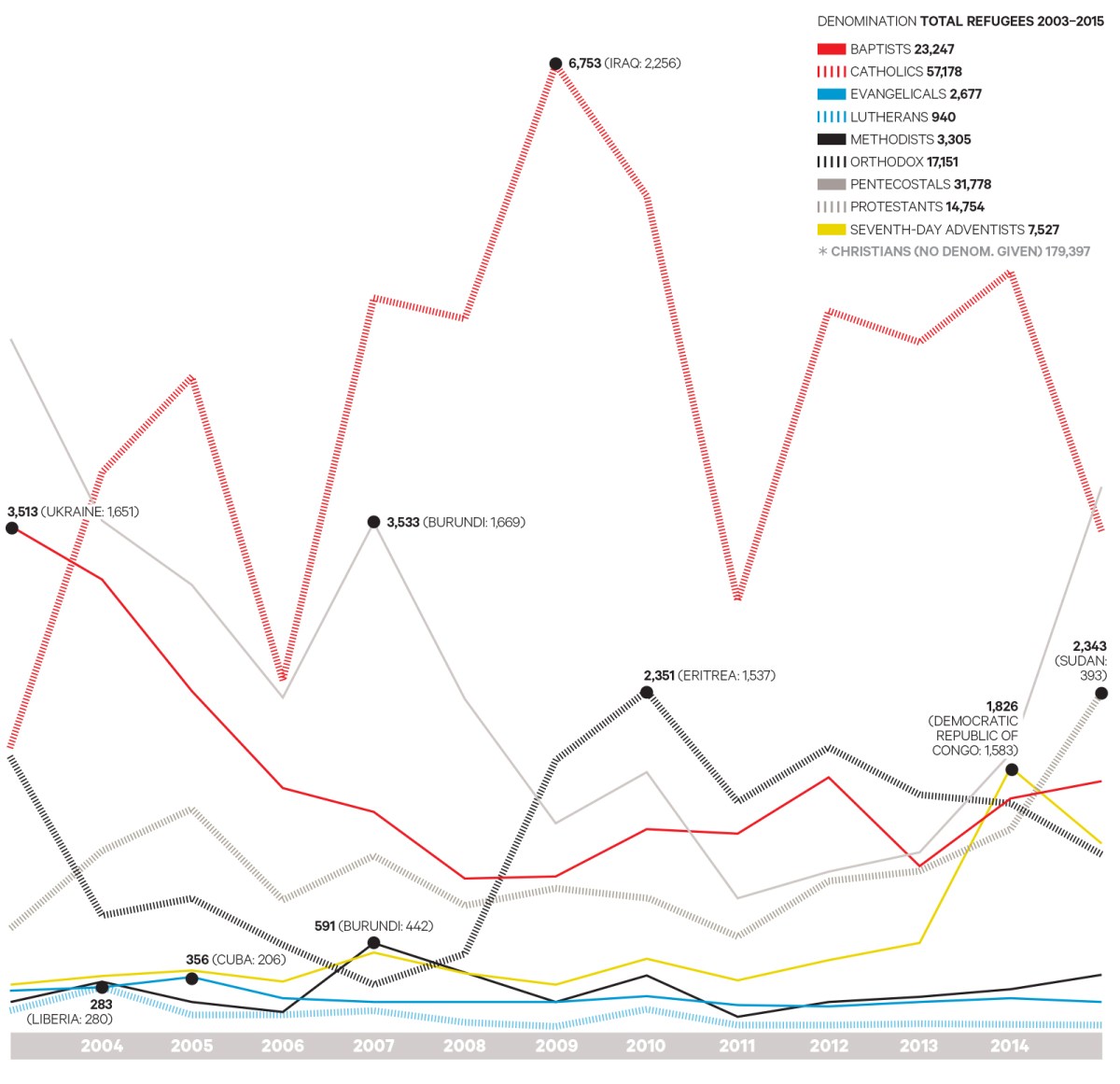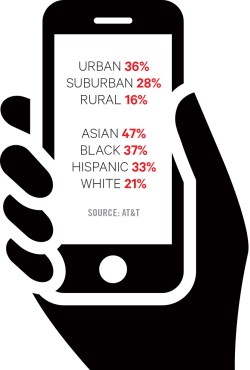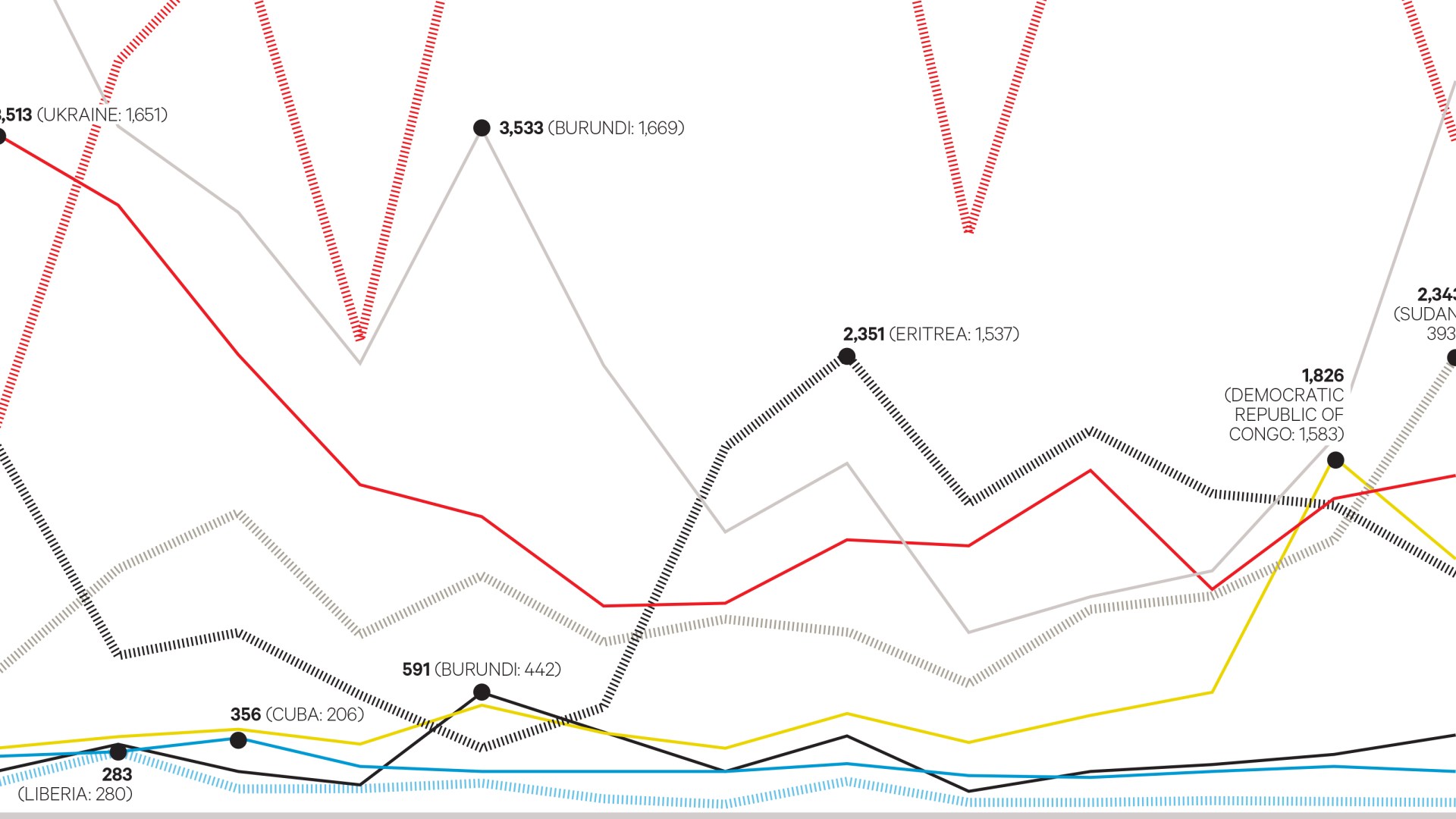Where America’s Christian refugees come from
As US lawmakers debated banning Syrian refugees after the terrorist attacks in Paris, some religious freedom advocates were concerned that only 53 of the 2,098 Syrians resettled in the United States at the time were Christians. World Relief explained that it takes many years before people displaced by conflict (like by ISIS in 2013) appear among America’s refugee intake, and uprooted middle-class Christians often choose to come on a tourist visa and apply for asylum instead. Overall, Christians compose about 44 percent of the 762,000 refugees resettled in America since 2003. Here are some highlights:

Biggest apology for Christian persecution ever
In “an astounding admission,” 145 leaders representing two billion Christians formally apologized for their denominations having abused each other in the past. Delegates from the World Evangelical Alliance (WEA), the Pentecostal World Fellowship, the World Council of Churches, and the Vatican met to discuss the abuse of Christians under militant Islam, but first acknowledged their own sins. While Catholic and Orthodox Christians have marginalized and denied civil rights to evangelicals, evangelicals have acted as if the historic churches knew little about the gospel and were in need of conversion, wrote WEA Global Ambassador Brian Stiller. The gathering, held in Albania, echoed apologies made by Pope Francis for Catholics’ former persecution of Pentecostals and Waldensians.
Saeed Abedini’s wife halts her advocacy over alleged abuse
In two emails to supporters, the wife of imprisoned Iranian American pastor Saeed Abedini said their marriage has included “physical, emotional, psychological, and sexual abuse.” Naghmeh Abedini, who has spent three years advocating for Saeed’s release from an Iranian prison, said she “cannot live a lie anymore” and will “take a break from everything and seek the Lord on how to move forward.” Attorneys for Saeed, who has been repeatedly beaten and blocked from medical treatment, said Naghmeh’s revelations don’t change the fact that Saeed is in a dangerous prison because of his faith. “Because of that, we were working to secure his release,” attorney Jay Sekulow said. “None of that has changed.”
‘Evangelical’ gets new definition
A two-year collaboration between the National Association of Evangelicals (NAE) and LifeWay Research has resulted in a new way to identify evangelicals in surveys. In what might be the first research-driven “creed,” the report identifies four key statements that define evangelical beliefs: “The Bible is the highest authority for what I believe”; “It is very important for me personally to encourage non-Christians to trust Jesus Christ as their Savior”; “Jesus Christ’s death on the cross is the only sacrifice that could remove the penalty of my sin”; and “Only those who trust in Jesus Christ alone as their Savior receive God’s free gift of eternal salvation.” Only those who strongly agree with each statement should be considered “evangelical by belief,” said the NAE. President Leith Anderson said the new method should help to consolidate evangelicals, often split in surveys by race or politics, and lead to more complete results about their views.
Supreme Court takes pro-life cases
Seven lawsuits involving hospitals, colleges, and charities that object to providing contraception through their health-insurance plans have finally risen to the US Supreme Court, which has agreed to consider them all. The justices will consolidate the cases and narrow the question to whether the regulations of the Affordable Care Act violate the Religious Freedom Restoration Act. In the same session, the Court will decide whether two requirements in Texas—that abortion clinics meet standards for outpatient surgery centers, and that abortion doctors have admitting privileges at nearby hospitals—place an “undue burden” on women. This is the first major abortion case to come before the court since its 2007 decision to uphold the partial-birth abortion ban.
Indonesia: ‘Religious harmony’ law shutters 1,000 churches
A decade ago, Indonesia passed a law requiring religious minority groups to collect signatures from the local majority group before building their own houses of worship. The bill was touted by lawmakers as a long-term solution to religious conflicts in a country that is 87 percent Muslim and 10 percent Christian. But since then, more than 1,000 Christian churches have closed, and others were prevented from being built. Christian leaders have complained that even though they fulfilled the signature requirements, local officials still denied them permits. Potential breakthroughs: The Indonesian Supreme Court ruled in favor of a suburban church outside Jakarta in 2011, and a Muslim leader identified by Open Doors as the “key person behind the church closures” passed away in October.
Myanmar: Christians not celebrating free elections just yet
Millions of Burmese celebrated the end of decades of military dictatorship after Nobel laureate Aung San Suu Kyi’s party won Myanmar’s first free elections. But Christians were more cautious. As Partners Relief and Development founder Steve Gaumer told CT, “The big question is: Will Myanmar’s dictators really follow through on their promises of reform?” The military regime had long been at odds with ethnic minorities, who contain the majority of the Southeast Asian nation’s Christians. And the elections haven’t exactly split the country open: the military still controls a quarter of parliamentary seats, and its clashes with ethnic minorities have yet to abate. While the elections can be considered encouraging, Open Doors analyst Thomas Muller told World Watch Monitor, “It’s too early to draw conclusions about the full outcome.”
Nepal: Faithful run out of fuel
In the weeks after Nepal declared itself a secular state (instead of returning to being a Hindu nation), Christian churches’ attendance plummeted—not for lack of faith but lack of fuel. India—a majority Hindu nation and Nepal’s top trading partner—cut off fuel from its neighbor, stopping the more than 300 petroleum tankers that once entered Nepal daily. The embargo curtailed travel for many Nepalis, including its Christian minorities. Church attendance has dropped as much as 50 percent in some places, AsiaNews reported. Nepal has turned to China for help.

Cell phones in church
One-quarter of Americans who attend church at least monthly now use a mobile device to “connect with faith or inspiration” during the service. Half look up the Scriptures or songs, and one-third take notes. But one-quarter of Americans also admit to using cell phones for unrelated activities such as texting, posting on social media, watching a video, or playing a game. Here’s how many confess in each of the following groups:











